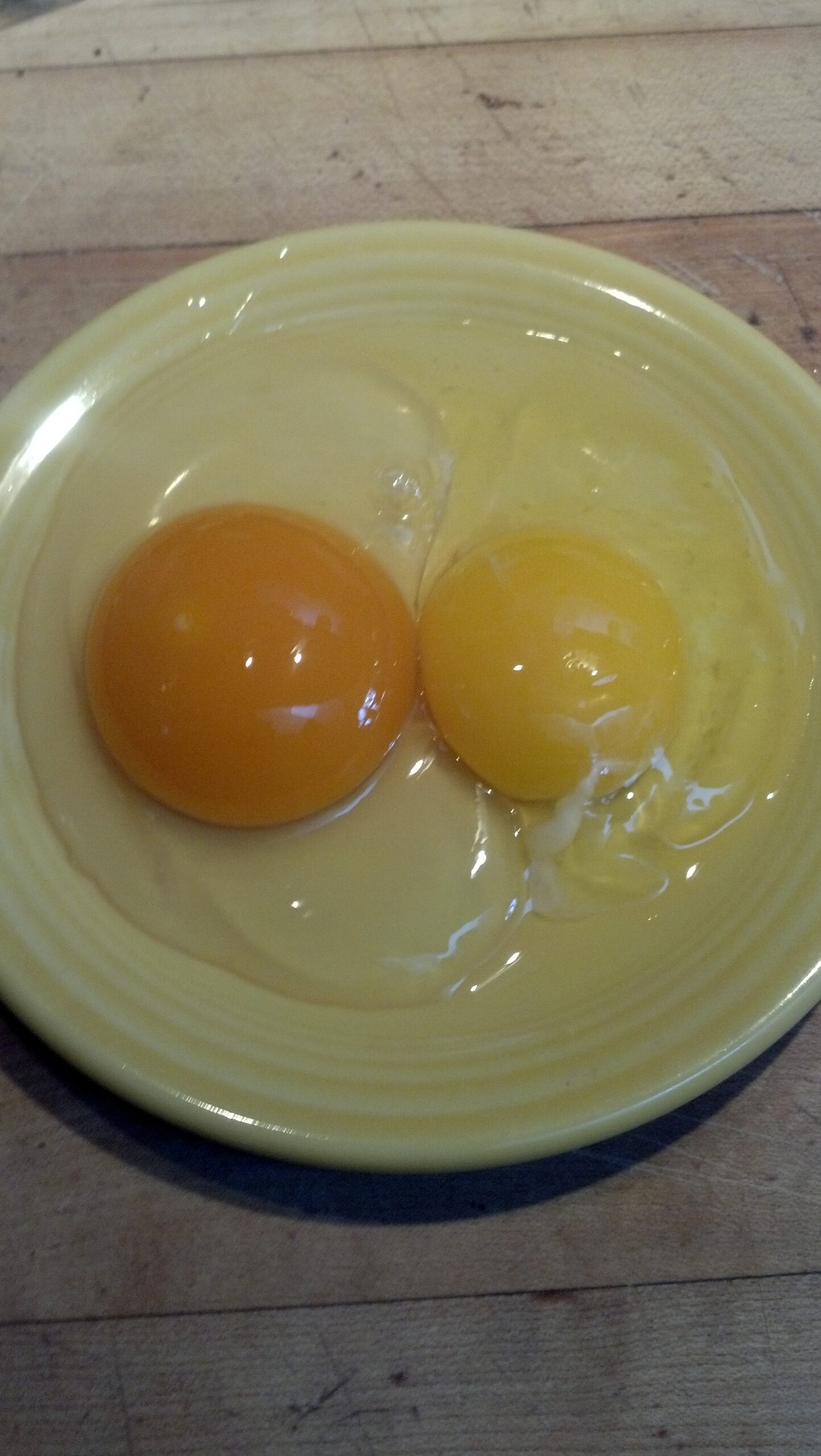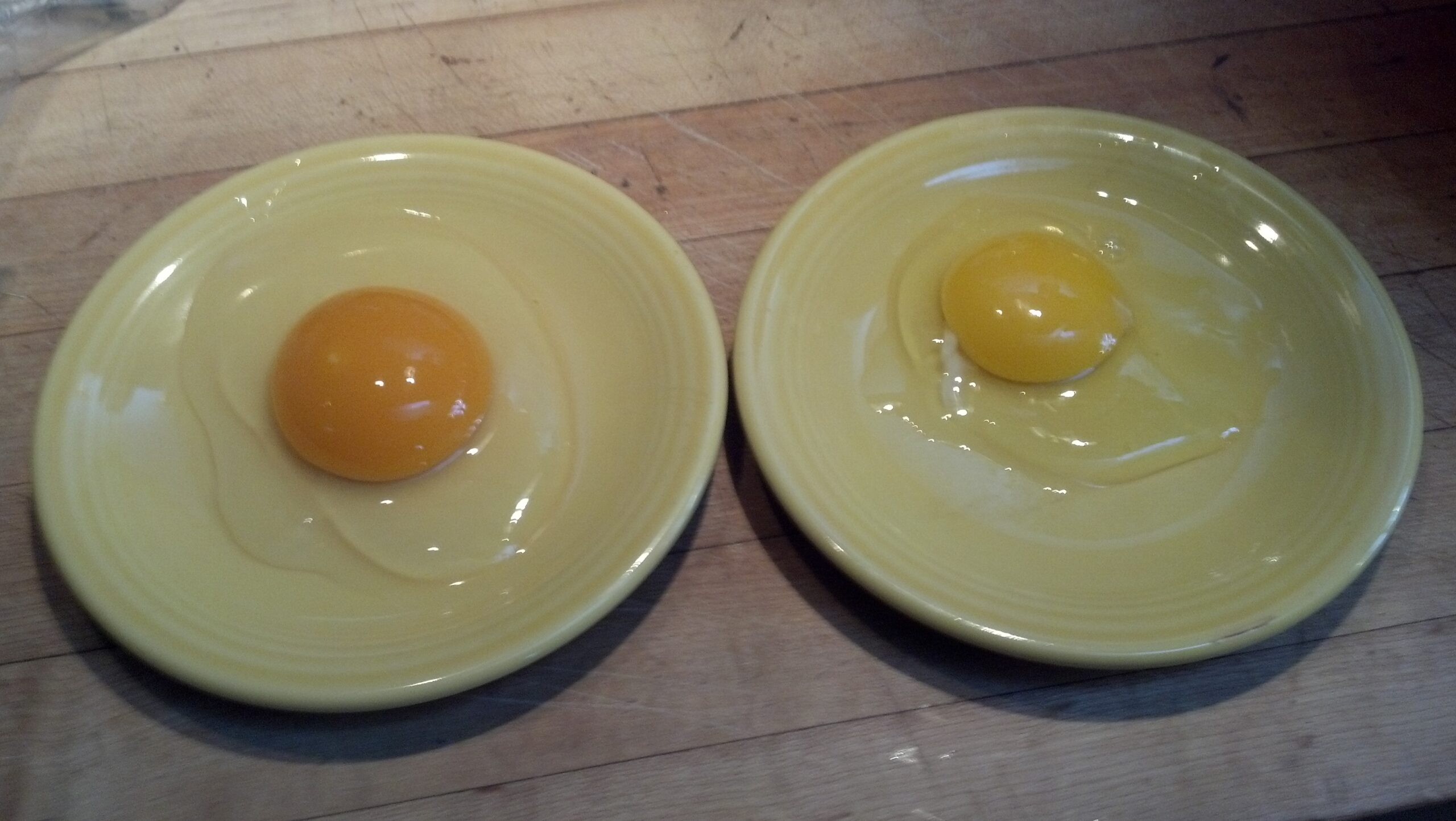For a growing family, I can’t think of a more perfect food than eggs. Rich in fat-soluble vitamins like A and D, eggs are an economical source of complete protein.
But beware: all eggs are not created equal. I wanted to share these pictures with you to show the comparison between the fresh eggs from our own flock of chickens on the left and the commercial imitation of an egg available at your local supermarket on the right.
Notice how the egg yolk from a hen raised on pasture is a deep orange compared to the pale yellow commercial yolk. It is actually shocking how bright the color is when you first start eating pasture-raised eggs.
Some friends have even questioned whether something was wrong with the eggs they were served because they were so orange! Imagine their horror when they found out the diet that had produced such “unnaturally” colored eggs: bugs and vegetable trimmings destined for the compost pile. This color is a sign of the nutrient-rich diet my hens have been enjoying and the health benefits passed on to my family when we eat these delicious eggs.
Even the egg whites are different. Did you know that the white should actually be composed of two distinct parts? There is a firmer inner ring surrounding the yolk and a thinner portion that spreads out at the edges. Most people don’t know this since you can’t detect it in factory-farmed eggs, but I think the picture above illustrates it well. Give these high-quality egg whites a try for the most fabulously textured meringues you have ever eaten!
What you can’t see in these two eggs are the vast differences in nutritional quality. When hens are allowed to feed on grass and insects as they were designed to do, they produce eggs high in beneficial omega-3 fatty acids. Commercial feeding practices, however, lead to eggs with high omega-6 fatty acids, but little omega-3s. The modern western diet already provides a dangerously high amount of omega-6s at the expense of omega-3s due to our high consumption of refined vegetable oils.
High omega-3 content is why Asian societies consider eggs to be a brain food. In fact, pregnant Chinese women often eat up to a dozen eggs per day and tests reveal their breast milk to be incredibly high in DHA, a fatty acid important for the brain development of their babies.
What about cholesterol, you might ask? Numerous studies cited in Sally Fallon’s Nourishing Traditions have found that cholesterol levels do not rise with egg consumption. In fact, eggs are a great source of choline, a B-vitamin that helps cholesterol stay moving in the blood stream. The cholesterol found in eggs plays a key role in brain development and forms the building blocks for hormones. From the age of four months on, it is actually a great idea to feed your child a cooked, mashed egg yolk a day. Wait until your baby is at least a year old before feeding egg whites, which contain proteins that are difficult for babies to digest.
Let me share a quick way to get more of this nutritional powerhouse into your diet. Add a raw egg yolk to your smoothies. Rest assured that eggs from pasture-raised chickens pose little threat of salmonella poisoning. Even so, you should wash the shell with hot, soapy water before using them raw and please only use pastured-raised eggs for this purpose. Commercial eggs are much too dangerous to eat raw because the chickens that laid them have been heavily treated with antibiotics.
_______________________________________________________________________________________________________
Check out my downloadable CD Secret Spoonfuls: Confessions of a Sneaky Mom to find tons more tips on getting your youngsters to eat nutritious foods that taste great. Lots more free articles and info on my website homeopathyworks.net.





I feed my children eggs from pasture raised chickens just about every morning. They love them and it keeps them full till lunch. I beleive it helps thier mood and is especialy great for school days as well, the fat and protien keep them satisfied and dare I say focused during their lessons!
Love those eggs! I do eat plenty of them.
I recently learned that eggs should not be washed until right before you are ready to use them. Apparently when the chicken lays her egg the shell has a protective coating that prevents bacteria from permeating the slightly porous shell. When we wash that protective coating off, the egg is much more likely to become contaminated with salmonella or other bacteria and go bad.
Also, when I lived in Europe I was surprised that the shops don’t refrigerate eggs, apparently this is an American custom that other parts of the world don’t share. Europeans consider eggs to be vastly superior when they are kept at room temperature (like tomatoes), and the grocery stores don’t seem to worry about eggs going bad when they are kept on shelves in the baking aisle next to the flour instead of in the refrigerated foods section.
Yes, we Americans have some things to learn from our European counterparts. Homeopathy is way more mainstream in Europe than it is here.
yes Laura Ingals stored them for the winter in barrels of staw. no cold till it got cold .
Interesting comment on the refrigeration of eggs. I was just speaking with a friend who works at a farm and she mentioned that once the eggs are refrigerated, they must remain refrigerated. There’s so much to learn!
We gave my brother in law some eggs once and he came back with the comment that the hens diet had too much sulphur (and not in a homeopathic way!!) in it, hence the colour of the yolk :)) Quail eggs are even more of a super-food, fiddly because they are small, but incredibly beautiful. XX
Cereal and/or fruit had been my breakfast habit for years, but I was always starving by 10AM and munching unhealthily to get through till lunch. Only learned recently that eggs would stave off hunger better. It absolutely works! Even just one egg for breakfast keeps me satisfied for hours longer as well as more energized. Who knew?….
This is all so true! I remember how surprised I was to notice the real differences in egg quality. As Joel Salatin pointed out in one of his books, the yolk of the pastured egg has ‘muscle tone’ as it stands up firmly unlike the saggy flat pale yellow yolks of the commercial eggs.
What a perfect description!
It is amazing the taste difference between those pastured eggs and store bought eggs!
Hi, Joette… I am one of your current webinar students. I was reading the materials for the upcoming class where you mentioned that you feed your chickens your own homemade organic mash. I also keep chickens. I feed them expensive commercial organic mash. Any chance you would share your recipe?
I no longer make my chicken feed, and I don’t know that I’ll remember the recipe, but I bought 50#+ bags of assorted, organic grains through my food coop and soaked a few cups of each in water for about 48 hours. this allowed the grains to begin the sprouting process hence making them more protein rich. It also yielded more feed .
Tina – we have 24 hens that we gather eggs from and we make our own scratch. We are not as diligent as Joette was to soak the grains though! We buy 50# bags of organic grains of wheat, oats, barley, millet, green peas, corn grits, sorghum, and oyster shell. My daughter mixes them in a bucket in a proportion that gives them the most protein (peas especially produce good layers) and then feeds them 4lbs of feed per 12 chickens. Cost wise it comes out to the same amount as buying 50# bags of organic scratch (we do not use mash), but there is greater variety for the hens in terms of the grain mixture.